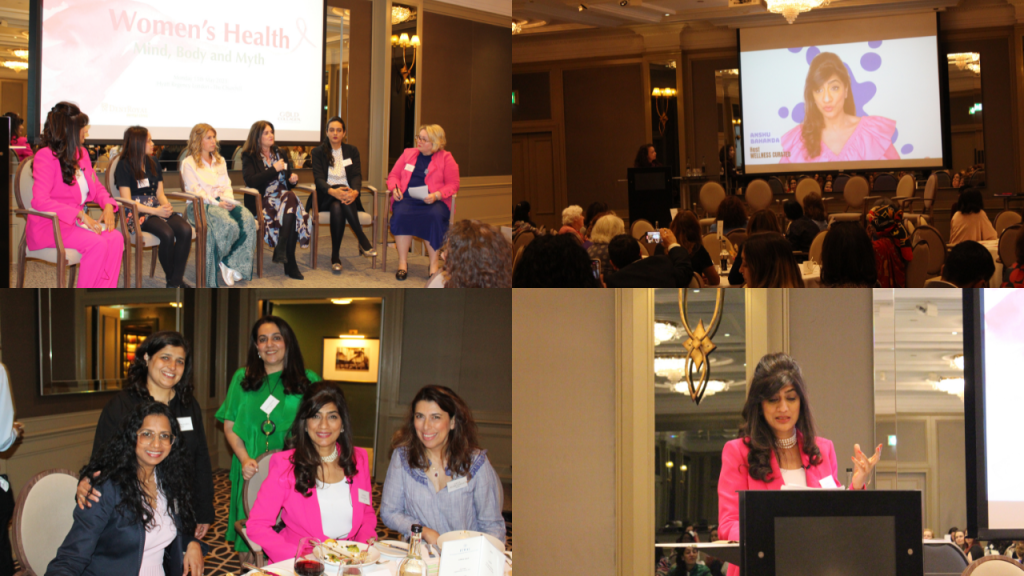Breaking barriers, igniting conversations
As the master of ceremonies at the FIWAL conference, a flagship event organised by Zehan Albakri and her team, I had the honour of spearheading an influential gathering centred around women's health.

This year, the unique platform brought together approximately 40 women’s charities and organisations under the umbrella of the Federation of International Women’s Associations in London (FIWAL) and, setting the stage for thought-provoking discussions on vital topics such as mental health and menopause.
The primary focus of the conference, as always, was to address and dispel common myths surrounding women’s health, particularly those pertaining to menopause and mental well-being. The idea was to provide expert insights, challenge misconceptions, and foster a deeper understanding of women’s health to promote informed decision-making for better overall well-being.
Dr Hannah Nazri, women’s health specialist and finalist of Women of the Future 2020, shed light on the deeply entrenched gender bias within the medical field during her captivating presentation titled “Taking charge of your health in a gender-biased world.” She not only urged patients to reclaim agency over their well-being but also challenged the system’s predisposition towards gender bias. Dr Nazri also highlighted society’s tendency to undervalue women post-menopause, perpetuating a narrative that fails to recognise their worth beyond reproductive capabilities.
In another notable session, Deborah Garlick, founder and CEO of Henpicked, delved into the intersection of menopause and the workplace. By raising awareness, providing strategies for managing menopause, and suggesting proactive measures for companies and offices, Deborah empowered attendees with a profound understanding of the issues at hand. It was a stark realisation that until recently, menopause was a glaring omission from school curricula, underscoring the need for change and education.
Dr Vidhi Patel, a captivating speaker, took the stage to illuminate the intricate connections between gut health, menopause, and mental well-being. Her insightful discourse dispelled myths and unveiled the profound impact of gut health on common menopausal symptoms like sleeplessness and bloating. Dr Patel also shared natural approaches to navigate these challenges, unravelling the profound influence of hormones on women’s holistic health.
Throughout the conference, our empowering discussions were complemented by practical solutions. Melissa Morbeck, global director of partnerships at the NO MORE Foundation, dedicated to working to end domestic violence and sexual abuse, led an engaging panel, answering audience questions and offering invaluable insights. This collaborative exchange of ideas fostered an atmosphere of growth and enabled attendees to leave with actionable knowledge.
After a nourishing lunch, we turned our attention to women’s health solutions, incorporating curated wellness videos and engaging in meditation and singing therapy sessions. The palpable energy in the room was contagious as we fearlessly shattered barriers, initiated crucial conversations, and confronted complex questions head-on.
The FIWAL conference proved to be a transformative experience, leaving an indelible mark on my journey. It fortified my commitment to champion women’s health as a critical focal point and fueled my determination to create a supportive environment where women can openly address their well-being. This event was a catalyst for change, emboldening women to seize control of their health and inspiring individuals to drive progress in this vital area of discourse.
What I discovered
It is crucial for individuals to remain vigilant, ask questions, seek second opinions, and advocate for their own well-being when navigating the complex landscape of healthcare

As part of an investigation that was launched in 2019 and is currently ongoing, police investigating the deaths of numerous patients at Gosport War Memorial Hospital in Hampshire have identified 19 suspects. An independent police investigation, codenamed Operation Magenta, was launched after it was discovered that the lives of hundreds of patients were shortened through the use of opioids at the hospital. More than 450 individuals had their lives shortened, while approximately 200 others were likely subjected to opioids without medical justification between 1989 and 2000, according to the Gosport independent panel report released in 2018. The report highlighted a concerning disregard for human life and a culture of administering dangerous doses of medication without clinical justification. To me, this case underscores the importance of vigilance and scrutiny when it comes to healthcare providers, as they may not always prioritise patients’ best interests. Other examples that come to mind:
- Opioid Crisis: Purdue Pharma, the maker of OxyContin, faced multiple lawsuits and entered into many settlements related to allegations that the company downplayed the addictive nature of their opioid medication, contributing to the opioid crisis in the United States.
- Off-Label Marketing: In 2012, GlaxoSmithKline paid a $3 billion settlement in the United States for various allegations, including off-label marketing practices and failure to report safety data regarding certain medications.
- Medical Negligence: India’s National Consumer Disputes Redressal Commission has recently ordered two doctors in Kolkata to pay INR 60 lakh to the family of a 37-year-old engineer who died due to medical negligence. According to the BMJ, there are about 5.2 million such cases in India each year – but very few are ever resolved.
- False Claims Act Violations: In 2012, Johnson & Johnson agreed to pay $2.2 billion to resolve allegations of improper marketing and false claims related to prescription drugs, including the promotion of off-label uses and kickbacks to healthcare providers.
- Product Liability: Merck faced lawsuits regarding their medication Vioxx, which was withdrawn from the market in 2004 due to safety concerns. The company later settled thousands of claims from patients who alleged that the drug caused adverse effects, including heart attacks and strokes.
With that in mind, it’s vital that you be proactive in your wellness journey. Here are some ways in which to do this:
- Research healthcare providers and seek recommendations from trusted sources.
- Ask questions and seek clarification about treatment options, procedures, and medications.
- Understand the potential risks and side effects associated with medications and treatments.
- Maintain open and honest communication with healthcare professionals, sharing relevant medical information and concerns.
- Advocate for your own health by actively participating in decision-making processes.
- Stay informed about healthcare policies, regulations, and advancements.
- Seek second opinions when necessary, especially for complex or critical medical situations.
- Keep a record of medical history, test results, and prescribed medications.
- Be aware of your rights as a patient, including access to medical records and informed consent.
- Stay updated on preventive care measures and recommended screenings.

